Last Updated on July 28, 2024 by Mary Phagan
In January 2008, I was contacted by Laura Longsworth, Producer for Ben Loeterman Productions, Inc. regarding a PBS documentary: The People vs Leo Frank and Loeterman Productions, Inc. requested an interview. Although "we had many conversations regarding the documentary. the producer appreciated my time and thoughts especially considering past experiences with the media and the bearing the murder of little Mary Phagan and trial of Leo Frank have on my life," I declined the interview.
However, Bill Kinney [Associate Editor at MDJ] encouraged me to do the interview because he felt it was important to include the living persons who best understand and are credible regarding the events.
February 4, 2008, I received a letter and a draft of topics to cover in the interview from Laura Longsworth, Producer of Ben Loeterman Productions, Inc. "We look forward to meeting you at the Breman on February 17th for the "Seeking Justice" exhibit. And we really appreciate you considering the possibility of granting us an interview on February 19th. We are making no assumptions that you will ultimately feel comfortable doing this but very much hope you will. We feel that you, and you alone, can bring to this documentary the authentic voice and perspective of the Phagan family. We would like very much to tell Mary's background and story and if you can help us do this, the film would be that much stronger. We can commit to having you be the sole voice on your family's background and we can also commit to explaining that Leo Frank's pardon did not absolve him of the murder of Mary Phagan."
List of topics:
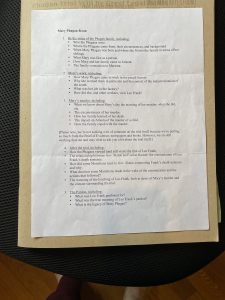
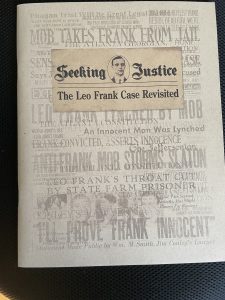
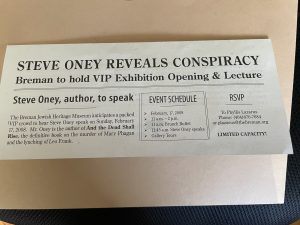
Sunday, February 17, 2008: The Breman Museum
Mary Phagan-Kean attends
"Seeking Justice" opened Sunday, February 10, 2008 at the William Heritage Museum in Midtown Atlanta. It is considered the first exhibition about the complicated story of Mary Phagan's murder, Leo Frank who was convicted of her murder and his lynching. The museum's Archivist Sandra Berman has been collecting artifacts and documents for over 20 years.
This is the first time that the description of Mary Phagan is accurate. The Phagan Family appreciated being interviewed and providing artifacts/documents for the exhibit.
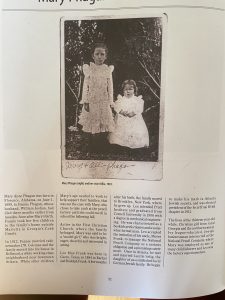
The interview date for Ben Loeterman Productions, Inc. was scheduled for February 19, 2008 in Sandy Springs at a period house built by the Candler family.
THE PEOPLE V. LEO FRANK
Premiere at the Cobb Energy Performing Arts Center
April 30, 2009, at 7:30 p.m.
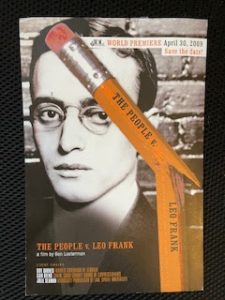
Ben Loeterman's 90- minute documentary about the 1913 murder of Mary Phagan and the 1915 lynching of Leo Frank in Marietta combines archival footage, interviews with scholars and reenactments that were filmed in Georgia 2008. Steve Oney, author of "And the Dead Shall Rise," served as chief historical consultant for the documentary and stated that "Ben Loeterman lives in Boston, but he went the extra mile to give fair play to the Southern view of the controversial subject."
Georgians who appear in the documentary included former Governor Roy Barnes, Mary Phagan-Kean, great-niece of Little Mary Phagan, state Senator Chuck Clay, Tad Brown, great-grandson of Tom Watson, Dan Cox, director of the Marietta History Museum, deputy Cobb County District Attorney Van Pearlberg, and Bill Kinney, MDJ's associate editor. The interesting aspect according to Steve Oney is "The People vs. Leo Frank is that Marietta got to tell it's side of the story."
On May 2, 2009, the Marietta Daily Jornal headlines:
Leo Frank film draws Praise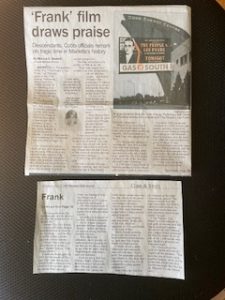
Descendants, Cobb officials remark on tragic time in Marietta's history
Phagan Murder 100 Years Later
Even so, a northern Jew had emerged as a more compelling suspect than a black man, Jim Conley, who was a janitor at the pencil factory and had plenty to implicate him as the killer. Frank was deemed a Yankee outsider by the local citizenry, while Conley, a man of the South and therefore one of their own by default, became the state's star witness against Frank.
It was a media sensation. The month long circus-like trial got spectacular treatment from rival newspapers, which helped whip the public into "a degree of frenzy almost inconceivable" (as The Atlanta Journal assessed the local state of mind).

Photo: Leo Frank.Frank was convicted and sentenced to death, and the city overwhelmingly rejoiced.
Then, after two years of appeals (which reached the U.S. Supreme Court), he was shown a bit of mercy by Georgia's conscience-stricken governor, who abruptly commuted Frank's sentence to life imprisonment.
This only reinflamed the civic uproar. Less than three months later, two dozen prominent citizens took matters into their own hands. This elite lynch mob removed Frank from the penitentiary where he was serving his life term and hanged him from an oak tree in Atlanta's neighboring town of Marietta. Thousands came to see: For them, justice had finally been delivered.
The story of Leo Frank has been told in many ways (including "Parade," a Broadway musical), but no more exhaustively than Steve Oney's splendid 2003 tome "And the Dead Shall Rise: The Murder of Mary Phagan and the Lynching of Leo Frank."
Now, in "The People v. Leo Frank," filmmaker Ben Loeterman has crafted an historical feature documentary that includes the voices of Oney (chief consultant on the project), former Georgia Gov. Roy Barnes, historians, members of the Frank and Phagan families, and "Parade" playwright Alfred Uhry, among others.
Framed by these speakers, the film's dramatizations transport the viewer to a tragic chapter for a region then proudly calling itself "the New South."
Loeterman, an award-winning filmmaker whose documentaries have aired on "Frontline" and "American Experience," says the interviews came first.
"We laid out the storytelling completely in the words of the interviews," he says, "and then figured out how the dramatic scenes could make the most of what those interviewees told us.
"It was critical for me to first get the story straight, before going off and getting distracted by the moviemaking."
The characters' dialogue is lifted from transcripts and letters. And the re-enactments were shot on location in and around Atlanta, to capture as much authentic look and feel as possible, even a century removed.
A vintage industrial elevator (crucial to the narrative) was found in a building that once stood near the long-gone National Pencil factory. The lynching scene was staged in a bucolic spot not far outside Atlanta, exactly where Loeterman chooses not to say.
The impressive cast is led by Seth Gilliam ("The Wire") depicting Jim Conley, and, as Leo Frank, Will Janowitz, who played Meadow's boyfriend Finn on "The Sopranos."
Despite a remarkable resemblance to Frank, Janowitz had a challenge in portraying him. Frank was chilly, stiff, high-strung, unengaging. He was, in short, not a showcase character, nor the ideal candidate for any film's protagonist. Nor, as history proved, was he a sympathetic defendant in a murder trial.
"He's not a hero, and he's not particularly likable," Loeterman says.
Frank was an ordinary man most distinguished by his outsider status. For that, he was savaged. As Loeterman's film documents painfully, the scars still haven't healed."
PBS televises "The People vs Leo Frank"
November 2, 2009 at 9:00 p.m.
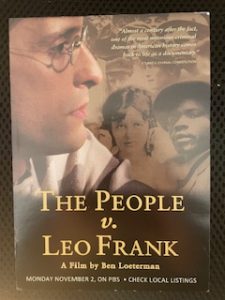
I received calls, emails about the interview. One of my best friends from high school stated:
"I watched the show. You did very well. You were factual and articulate. It was an interesting show. It was also interesting to see that the descendants of so many involved were still interested in something that happened almost 100 years ago. That shows that the community was heartbroken by such a cruel act of the murder of a child.
I also remember my grandmother playing the Victrola record and telling me about it as a child. She lived in Birmingham, Alabama. This was heard all over the country and I don't think there was as meanness as there is now. I think people were shocked by it.
It was great to see you on TV. You were marvelous."
Margaret Ann* [We had a spend the night party at Margaret's house in high school and she played the record of Little Mary Phagan on the Victrola and later her family gave me the record]
- Preface: Final [Last Updated On: October 7th, 2024] [Originally Added On: October 16th, 2023]
- Chapter 15: 1995: The secret deceitful underhanded revisionist political Marker Change at Mary Phagan's Grave by the Parks and Tourism Committee, Marietta City Council and the Jewish Community. Final [Last Updated On: July 28th, 2024] [Originally Added On: October 16th, 2023]
- Chapter 13: 1987-1988 Mary Phagan NBC "Docudrama" Final [Last Updated On: July 28th, 2024] [Originally Added On: October 20th, 2023]
- Chapter 17: 2003: Steve Oney Publishes Book Final [Last Updated On: October 13th, 2024] [Originally Added On: November 5th, 2023]
- Chapter 16: 1998: Parade the Broadway musical is a corruption of history and radical attempt to whitewash a horrible murder and pin it on Jim Conley, a Negro Final [Last Updated On: October 13th, 2024] [Originally Added On: November 5th, 2023]
- INTRODUCTION: FINAL [Last Updated On: April 3rd, 2024] [Originally Added On: December 18th, 2023]
- Chapter 18: Leo Frank Historical Marker Approved in 2006; Dedicated 2008 Final [Last Updated On: July 28th, 2024] [Originally Added On: January 4th, 2024]
- Chapter 20: 100 years: 2013 Final [Last Updated On: July 28th, 2024] [Originally Added On: January 14th, 2024]
- Chapter 26: Phagan Family Position Paper 2021 Final [Last Updated On: July 28th, 2024] [Originally Added On: January 14th, 2024]
- Chapter 25: Jonathan Greenblatt: August 17, 2023, 2022, 2021 Final [Last Updated On: July 28th, 2024] [Originally Added On: January 14th, 2024]
- Chapter 21: 2015: 100 years after Leo Frank Lynching Final [Last Updated On: July 28th, 2024] [Originally Added On: January 15th, 2024]
- Chapter 22: 2019: Fulton County Conviction Integrity Unit [CIU] Established to Exonerate Leo Frank Final [Last Updated On: December 9th, 2024] [Originally Added On: January 21st, 2024]
- Chapter 28: January: 2024-2025 Fani Willis, Fulton County DA Investigated by Georgia Senate Commission Final [Last Updated On: April 12th, 2025] [Originally Added On: January 23rd, 2024]
- Chapter 27: Cobb Librarian Discusses the Lynching of Leo Frank: 2023 Final [Last Updated On: July 28th, 2024] [Originally Added On: January 23rd, 2024]
- Contents: Final [Last Updated On: August 13th, 2024] [Originally Added On: March 25th, 2024]
- Glossary: Final [Last Updated On: October 10th, 2024] [Originally Added On: March 25th, 2024]
- Appendix [Last Updated On: June 18th, 2024] [Originally Added On: March 25th, 2024]
- Dramatis Personae/Who's Who: Final [Last Updated On: October 10th, 2024] [Originally Added On: March 25th, 2024]
- Epilogue: Final [Last Updated On: December 17th, 2024] [Originally Added On: March 25th, 2024]
- Chapter 24: Roy Barnes Mercer Law School (November 12, 2019) Final [Last Updated On: July 28th, 2024] [Originally Added On: June 1st, 2024]
- Chapter 23: Fulton County Paul Howard defeated by Fani Willis; November 6, 2019 Final [Last Updated On: July 28th, 2024] [Originally Added On: June 1st, 2024]
- Chapter 29: Seeking Justice for Little Mary Phagan: Add Newsletters 2-14 Here Phagan Family Newsletter Collection [Last Updated On: April 12th, 2025] [Originally Added On: July 23rd, 2024]